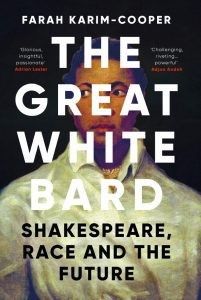From big musical production West Side Story to Indian films like Haider and countless stories grown from seeds sown by him, the influence of William Shakespeare on popular culture is inescapable.
While most can’t deny the genius of the great bard, some find him unappealing or inaccessible and many have unanswered questions about him.

Professor Farah Karim-Cooper has dedicated her career to the genius playwright and decided to unveil a Shakespeare fit for the 21st century with her new book The Great White Bard: Shakespeare, Race And The Future. Delving into Shakespeare’s racialised language and imagery, the detailed book challenges preconceptions and enriches understanding of his place in everyone’s collective history.
With a piercing analysis of famous plays from Othello and The Merchant of Venice to The Tempest, and a radical reappraisal of Elizabethan society, the book directly confronts the discomforts of his plays and language.
It ultimately breathes fresh life into the plays performed across centuries and empowers performers, students, scholars, and theatre-lovers of all backgrounds to claim Shakespeare as their own. This book continues the impressive work of the co-director of education at Shakespeare’s Globe and Professor of Shakespeare Studies, King’s College London.
Eastern Eye caught up with her for a fascinating discussion about her new book, inspirations, Shakespeare, his connection to race and what made him such a special talent.
Could you tell us what first connected you to William Shakespeare?
I fell in love with Shakespeare in my English class when I saw Franco Zefferelli’s timeless classic, Romeo and Juliet. I, like all 15-year-olds, was drawn to its focus on adolescent passion, but it also felt relatable to me in its portrayal of patriarchy and the limitations on girls – experiences that resonated with my mother’s and grandmother’s growing up.
Tell us about the work you do at Shakespeare’s Globe?
I am one of the two directors of education, and oversee our provision of higher education courses and our research and scholarly activities. I sit on the directorate and support the whole organisation’s strategy and creative output.
What would you say inspired you to write this book?
I ran a Shakespeare and Race festival in 2018 at the Globe and found that many people didn’t understand what Shakespeare had to do with race. I also noticed a lot of racial disparities in the way Shakespeare was taught, how he is researched, who gets to be a Shakespeare scholar and how some segments of the audience find it difficult when black or minority ethnic actors play important roles in Shakespeare productions. So, I wanted to tell people about Shakespeare’s preoccupation with race, interracial relationships, and his awareness that white supremacy was a growing phenomenon in his own time.

Tell us about the book?
The book tells the story about how Shakespeare came to be the epitome of English national genius and why this narrative is embedded in the belief, in the 18th century, in white English supremacy. For years scholars have been writing about race in Shakespeare, but this work has been systematically ignored not just by the academic world but also in the trade publishing world. So, I wanted to bring it to light and share how my knowledge of Shakespeare, his time, his theatres, and the history of race can help us to see a new writer, one that is resistant to fossilising and one that does not need to be cancelled either.
Who are you hoping connects with this book?
I would love for actors, directors, students, Shakespeare lovers and teachers to connect with the book. I also hope ultra conservatives and its press connect to it and look past their fears of ‘woke’ and see that Shakespeare’s canon engages with race and speaks to people from all backgrounds, which is one of the most enduring features of his work and so it is okay to interrogate his words and de-sanctify him.
You are a professor of Shakespeare studies, but did you learn anything new while writing this book?
I learned a lot about the 18th century which I had not specialised in before. I discovered the paradoxical but disturbing relationship between culture, art, taste, drama, and wealth acquired from the trans-Atlantic slave trade in 18thcentury Britain, and how this contributed to Shakespeare’s canonisation as the greatest writer.
What do you think sets this apart from other books on William Shakespeare?
A lot of other books on Shakespeare tend to make his work feel more benign than it is, so readers find it comforting, which is great. But my book asks us to be okay with discomfort and ambiguity and argues that our love for Shakespeare isn’t harmed by questioning our previous assumptions, and viewing his work through the lens of race.
Which of Shakespeare’s works is your own personal favourite?
Titus Andronicus set in ancient Rome is Shakespeare’s first and bloodiest tragedy. It has an extraordinary portrayal of Black identity that showcases Shakespeare’s interest in race from the outset.
Why do you think he was able to write such timeless pieces?
Shakespeare was an extraordinary storyteller. But it is not because he understood human nature and therefore shows us who we are or has invented us humans; instead, he was as flummoxed, horrified and delighted by and as confused about human nature as we are, so we go on a journey with him and it is sometimes uncomfortable, tragic, or hilarious. But it is a journey we are already on. Who better to take with us on this ride?
Why do you think he remains more relevant than ever today?
Because his work raises questions we are still grappling with, such as; what happens when multiple cultures and identities converge in capitalistic environments? What impact is there when nature is being destroyed by our greed? What happens to interracial love in supposedly ‘tolerant’ white societies? Why is justice available to some and not to others? Why is racist humour and cruelty still considered so funny?
What inspires you as a writer?
I am inspired by the desire to make positive change. I have written academic books which have focused on theatre, performance, and the body in Shakespeare’s time, but I want to write books that speak to a wider readership and that can contribute to a national conversation about how we talk about the past.
What do you enjoy reading?
I love reading fictionalised accounts of real people in history, particularly black people or people who are minoritised in some way. Because the archives don’t tell us enough, I find it inspiring when creatives, playwrights or authors tell those stories for us. I particularly loved On Wilder Seas: The Woman on the Golden Hind by Nikki Marmery and The Secret Diaries of Charles Ignatius Sancho by Paterson Joseph.
Why should we pick up your new book?
Because Shakespeare is still such a dominant presence in schools and in theatres as well as in universities. He is a cultural icon, but if we continue to see him as a beacon of white identity and English exceptionalism, it will exclude people and perhaps render him irrelevant. I hope my book will show that Shakespeare is not white property and that in fact, even in his own time, such a thought would have made him shiver.
The Great White Bard is set to be published by Oneworld on Thursday (27)

